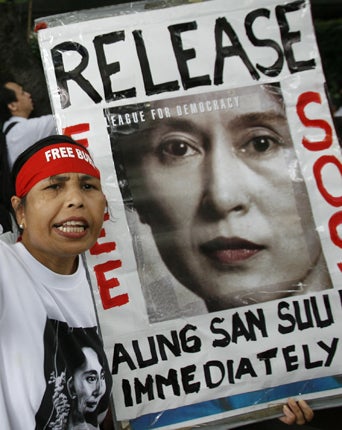Suu Kyi made to wait for trial verdict amid legal wrangling
Observers say 'suspicious' adjournments are designed to make court appear fair

A Burmese court has postponed its verdict in the trial of the opposition leader Aung San Suu Kyi, her lawyer said yesterday.
Ms Suu Kyi, a Nobel Peace Prize winner who has spent 14 of the past 20 years in detention, is charged under Section 22 of a law protecting the state from "subversive elements". A guilty verdict was widely expected yesterday. "The judge adjourned the trial until 11 August. He didn't elaborate on the reason why," said Nyan Win, a lawyer for the veteran pro-democracy leader. A diplomatic source who attended the proceedings said the verdict was delayed "because of the need to interpret legal terms relating to the 1974 constitution". The charges stem from a bizarre incident in May, when an American intruder, John Yettaw, swam across Lake Inya to Ms Suu Kyi's home, where he stayed uninvited for two days.
Prosecutors said this breached the terms of her house arrest. Mr Yettaw told the court in May that he was "sent by God" to warn Ms Suu Kyi she was going to be assassinated. Mr Win said Ms Suu Kyi was cheerful during yesterday's brief court session and told him the adjournment was "typical".
Benjamin Zawacki, a Burma specialist at the human rights group Amnesty International, said the repeated adjournments were orchestrated by Burma's ruling military junta to make the court appear fair and impartial. "It is very suspicious, since most courts wouldn't take this long," he said. "We knew the verdict was decided long ago. This is clearly political and not legal."
A Western diplomat in Rangoon said the junta could be stalling as a result of international condemnation of the trial. "The regime wants to take its time because of the mounting pressure it is under," the diplomat said. "They are being attacked from all fronts and they have a lot of things to consider."
Ms Suu Kyi's legal team has argued that she should be acquitted because the law she is charged under was part of the 1974 constitution, which is no longer in use. The prosecution, however, says the charges are relevant because the 1974 constitution was still in force when Ms Suu Kyi's latest period of house arrest commenced in 2003.
The courts routinely favour the junta, which has ruled Burma with an iron hand since a 1962 coup. Verdicts were also postponed for Mr Yettaw and two women who live with Ms Suu Kyi and who face charges similar to hers. Ms Suu Kyi faces five years in prison if found guilty. Mr Yettaw is charged with immigration offences and for the municipal violation of swimming in a non-swimming area.
Burma could improve ties with America, which has long imposed sanctions on the country, if it released Ms Suu Kyi, the US Secretary of State Hillary Clinton said at a regional security forum in Thailand last month.
But neither Western sanctions nor a strategy of engagement by Burma's neighbours in South-east Asia has achieved much over the years. Burma occupies a strategic place between the Asian powers India and China and both have been reluctant to apply pressure on the generals.
Opponents of Burma's military government say the trial is an attempt to keep Ms Suu Kyi in detention before and during elections next year, which they say will be a sham intended to legitimise the regime.
Dr Maung Zarni: Burmese leadership's mad behaviour betrays its fear
Comment
It was billed as the climax of this farcical trial. The media was there, foreign diplomats had come from as far away as Bangkok. They left the madhouse, baffled.
True to form, Burma's Senior General Than Shwe pulled off a surprise move from the handbook of psycho-warfare. Emotions had been built up, so the man deflates them. The excuse, according to a diplomat who quoted the judge, was that more time was needed to interpret the 1974 constitution. Even taken at face value, this means that men with depraved minds reign in Burma.
Since when have military generals tried to resurrect constitutions which they themselves abolished when they usurped power? Their desire to hold on to power is so great that being seen to behave madly is a small price to pay.
Even the 1974 constitution adopted under the one-party dictatorship of General Ne Win with "91 per cent of popular votes" was not worth the paper on which it was written. The 2008 constitution pushed through over the bodies of 140,000 Burmese who died in last year's cyclone has not come into force yet.
The real reason for yesterday's decision may be that 8.8.88, the 21st anniversary of the popular uprising which toppled Ne Win's corrupt, incompetent dictatorial rule but failed to seize power and install a new government, is around the corner. Generally, anniversaries make these men sleep in their bunkers and war-rooms.
The only thing that needs to be interpreted in Burma is Than Shwe's words and whims. Astrologers, occultists and fortune-tellers, of course, already do it, for handsome fees and access to power.
The leadership's mad behaviour betrays its fear. They have guns, but they are cowards, with neither the balls to face either the world or the public in whose name they justify their madness. But why are they so scared of Aung San Suu Kyi, a 64-year old, harmless widow?
Change will come to Burma, for better or worse but the road is going to be a long and painful one.
The writer is the founder of the Free Burma Coalition and a visiting Fellow on Burma at the LSE
Subscribe to Independent Premium to bookmark this article
Want to bookmark your favourite articles and stories to read or reference later? Start your Independent Premium subscription today.

Join our commenting forum
Join thought-provoking conversations, follow other Independent readers and see their replies